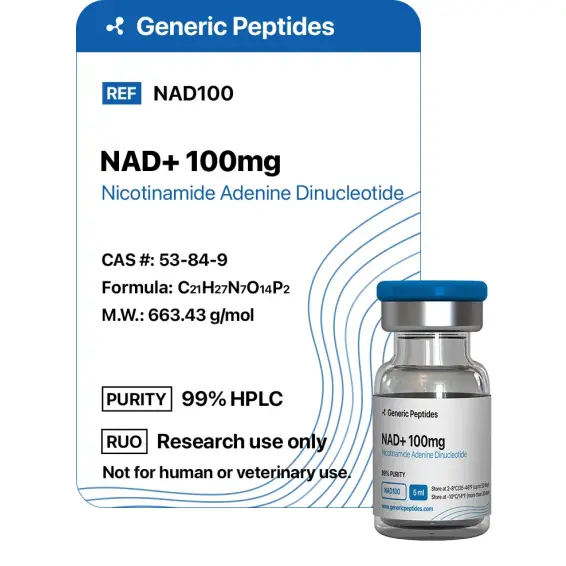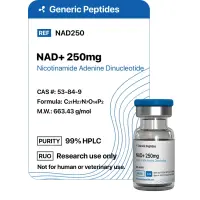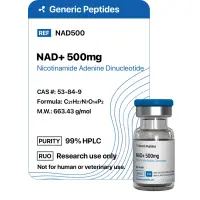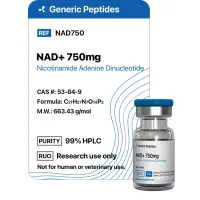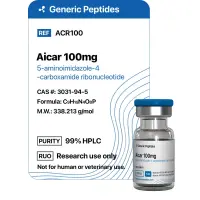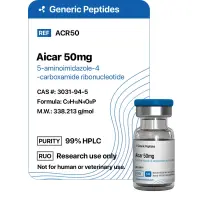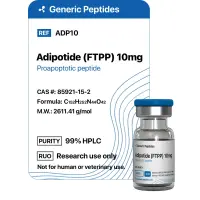- Active Substance: Nicotinamide Adenine Dinucleotide
- Concentration: 100 mg per vial
- Pack Size: 1 vial
- Manufacturer: Generic Peptides
- Brand Name: NAD (Generic Peptides)
- Synonyms: Nicotinamide Adenine Dinucleotide, Diphosphopyridine Nucleotide (DPN), Coenzyme I
- Molecular Formula: C21H27N7O14P2
- Molecular Weight: 663.43 g/mol
- Form: Lyophilized Powder
Shipping
NAD+ 100mg from Generic Peptides, a profoundly significant coenzyme that is central to countless cellular functions. This highly purified form of Nicotinamide Adenine Dinucleotide (NAD+) represents a crucial tool for advanced research into cellular metabolism, energy production, and the intricate biology of aging. Generic Peptides is committed to supplying NAD+ of exceptional quality, backed by meticulous documentation, ensuring the utmost reliability and precision for your groundbreaking scientific investigations.
Our detailed product profile is meticulously designed to equip researchers with a comprehensive understanding of NAD+'s vital characteristics, facilitating its precise and confident integration into rigorous biochemical and physiological studies. We aim to answer your most pertinent questions about this essential compound, from its fundamental molecular structure to its observed roles in various biological systems. This information serves as an indispensable resource for those engaged in advanced studies, seeking to navigate the complex landscape of cellular energetics and age-related processes. Generic Peptides strives to be your trusted partner in scientific exploration, providing compounds that meet the highest standards of purity and utility.
Product Information: NAD+ 100mg
NAD+, or Nicotinamide Adenine Dinucleotide, is a ubiquitous and absolutely vital coenzyme found in all living cells, acting as a pivotal player in cellular energy production and metabolic regulation. Each of our NAD+ 100mg vials supplied by Generic Peptides contains a meticulously purified form of this critical molecule, produced under exceptionally stringent quality control standards. This rigorous manufacturing process guarantees the high purity level that is absolutely essential for conducting demanding and accurate biochemical and cellular research protocols, thereby ensuring consistent and reliable experimental outcomes. The compound is consistently supplied as a stable lyophilized powder, which offers both excellent long-term storage stability and remarkable ease of reconstitution, accommodating a wide array of diverse experimental designs.
The precise 100mg concentration per vial provides a standardized and convenient unit, crucial for accurate dosage calculations and efficient experimental scaling across various research models, from in vitro cell cultures to more complex biological systems. Furthermore, the lyophilized format significantly enhances shelf-life and simplifies storage requirements, making it a highly practical and reliable choice for both short-term and long-term scientific projects. Generic Peptides stands firmly behind the quality and integrity of every vial, providing a dependable foundation for reproducible and impactful scientific discoveries. Researchers can confidently rely on the consistency of this active substance, minimizing confounding variables and optimizing their experimental rigor, which is paramount when studying such a fundamental biological component.
Product Description: NAD+, The Central Hub of Cellular Energetics
NAD+ distinguishes itself as a fundamental coenzyme, existing in two primary forms: Nicotinamide Adenine Dinucleotide (NAD+) and its reduced form, NADH. This dynamic duo plays an indispensable role in countless enzymatic reactions throughout the cell, acting as electron carriers in redox (reduction-oxidation) processes that are central to metabolism. Unlike simple nutrients, NAD+ is a complex molecule vital for the very flow of energy that sustains life, serving as a 'currency' for electron exchange within the cell. Its pervasive involvement means that disruptions in NAD+ levels can have far-reaching implications for cellular health and function, making it a critical area of scientific investigation.
The ubiquity and profound importance of NAD+ make it a compelling subject for extensive research. It is intricately involved in both catabolic pathways, which break down molecules to release energy (e.g., glycolysis, Krebs cycle, oxidative phosphorylation), and anabolic pathways, which build complex molecules. This dual role underscores its central position in maintaining cellular homeostasis and metabolic flexibility. Understanding how NAD+ levels are regulated and how they influence various cellular processes is key to unlocking new insights into health, disease, and the aging process. Researchers utilizing NAD+ from Generic Peptides are exploring a molecule that sits at the very heart of cellular life, offering a rich landscape for groundbreaking discoveries in biochemistry and cellular biology.
Mechanism of Action: The Multifaceted Roles of Nicotinamide Adenine Dinucleotide
The diverse pharmacological efficacy of NAD+ stems from its multifaceted roles as a coenzyme in critical cellular processes, primarily through its capacity to cycle between its oxidized (NAD+) and reduced (NADH) forms. As an electron acceptor, NAD+ is crucial for catabolic reactions like glycolysis and the Krebs cycle, where it picks up electrons, becoming NADH. This NADH then donates electrons to the electron transport chain, generating ATP, the cell's primary energy currency. This fundamental role in energy metabolism ensures that cells have the power needed for all their activities, from muscle contraction to gene expression.
Beyond its direct involvement in energy production, NAD+ serves as a vital substrate for several key enzyme families that play crucial roles in cellular regulation and stress response. These include sirtuins (SIRT1-7) and poly(ADP-ribose) polymerases (PARPs). Sirtuins are a family of protein deacetylases involved in regulating gene expression, DNA repair, inflammation, and cellular responses to stress and nutrient availability, many of which are implicated in the aging process and metabolic diseases. PARPs are critical enzymes primarily involved in DNA repair, maintaining genomic stability, and regulating programmed cell death, highlighting NAD+'s role in preserving cellular integrity and preventing pathological processes.
The consumption of NAD+ by these enzymes influences its cellular availability, creating an intricate regulatory loop. As NAD+ levels decline, particularly with aging, the activity of sirtuins and PARPs may be compromised, leading to impaired cellular function and increased susceptibility to damage. Conversely, research explores how augmenting NAD+ levels might enhance the activity of these enzymes, potentially supporting cellular resilience and overall health. Understanding these complex interdependencies is central to current research efforts to modulate cellular function and explore new strategies for addressing age-related decline and metabolic dysfunction, underscoring the broad implications of NAD+ in cellular pharmacology.
Observed Effects & Potential Side Effects
Based on extensive preclinical studies and initial clinical investigations, NAD+ supplementation has consistently demonstrated a range of significant effects pertinent to cellular health and metabolic regulation. These observations are crucial for researchers to meticulously consider when designing their experiments and interpreting results, providing a strong foundation for future inquiry. A prominent effect observed in research is an improvement in mitochondrial function, leading to enhanced energy production and cellular vitality. Studies have also indicated a positive impact on metabolic flexibility, potentially improving glucose and lipid utilization in various models, which is vital for maintaining metabolic homeostasis.
Furthermore, research suggests that NAD+ influences sirtuin activity, leading to observed benefits in DNA repair mechanisms and modulating inflammatory responses, which are critical for cellular longevity and resilience. Preclinical data has also indicated potential neuroprotective effects and improvements in muscle function, suggesting a broader systemic impact beyond direct metabolic pathways. However, it's important to note that while NAD+ is generally well-tolerated in research at typical concentrations, potential mild side effects have been observed in some studies. These may include mild gastrointestinal upset, such as nausea or stomach discomfort, particularly at higher concentrations or with specific administration routes. Researchers are strongly advised to meticulously monitor their experimental models for these and any other unexpected observations during their studies, rigorously documenting all findings to contribute to the growing body of scientific knowledge. It is paramount to understand that these observations are derived exclusively from controlled research environments and constitute a basis for further scientific exploration and understanding of this complex coenzyme.
Use Case : Optimizing Research with NAD+ 100mg
From a Clinical Pharmacologist's perspective, the investigational applications for NAD+ 100mg are exceptionally broad and highly pertinent to addressing foundational questions in cellular biology, aging, and metabolic health. Its central role in cellular processes opens up numerous avenues for designing diverse, impactful, and hypothesis-driven studies. Researchers can design meticulous studies to thoroughly investigate NAD+'s profound influence on mitochondrial biogenesis and function, examining its precise effects on ATP production, oxidative stress, and overall cellular respiration in various in vitro and in vivo models. This allows for a deeper understanding of its role in cellular energy dynamics.
Furthermore, NAD+ 100mg enables rigorous investigations into its capacity to modulate sirtuin and PARP activity, exploring subsequent impacts on DNA repair mechanisms, epigenetic regulation, and cellular longevity pathways. This research is crucial for understanding its potential role in healthy aging and age-related diseases. The compound also facilitates compelling research into its potential to mitigate metabolic dysfunction, such as improving insulin sensitivity and lipid metabolism in models of obesity and type 2 diabetes, thereby shedding critical light on new therapeutic avenues for these widespread conditions. Beyond these, researchers can conduct comprehensive studies on the effects of NAD+ on various physiological systems, including neuroprotection in models of neurodegenerative diseases, improvements in cardiovascular health, and enhanced muscle performance and recovery, offering a holistic view of its systemic impact.
Detailed Pharmacokinetics and Pharmacodynamics (PK/PD) profiling can be undertaken to precisely analyze NAD+'s absorption, distribution, metabolism, excretion, and the exact temporal relationship between its concentration in biological systems and its observed pharmacological effects. This is crucial for optimizing research designs and understanding its bioavailability. Finally, the fundamental biological role of NAD+ makes it ideal for sophisticated comparative biochemical studies, where its effects can be directly benchmarked against various precursors (like NMN or NR) or other metabolic modulators, allowing for the precise elucidation of the unique advantages and synergistic contributions of direct NAD+ supplementation across a variety of cellular and organismal models. The 100mg concentration provides a flexible and robust starting point for a wide array of sophisticated experimental designs, enabling comprehensive and impactful research projects across the spectrum of cellular and metabolic biology.
FAQs
What is NAD+ 100mg primarily used for in scientific investigation?
NAD+ 100mg is a novel investigational compound currently being utilized in scientific research to explore its profound potential effects on cellular metabolism and the aging process. This includes advanced studies in areas such as mitochondrial function, DNA repair, and the intricate roles of sirtuin and PARP enzymes, making it a focal point for understanding fundamental cellular health.
How does NAD+ 100mg function within cells?
NAD+ 100mg functions as a critical coenzyme, essential for electron transfer in metabolic redox reactions, thereby enabling energy production (ATP synthesis) across various cellular pathways. It also serves as a vital substrate for key enzymes like sirtuins and PARPs, which are deeply involved in regulating gene expression, DNA repair, and cellular stress responses, highlighting its central role in cellular signaling and maintenance.
What are the general storage recommendations for NAD+ 100mg?
For optimal stability and to preserve its integrity for research, NAD+ 100mg should be stored in a cool, dark environment, ideally refrigerated (between 2°C and 8°C or 36°F and 46°F) and protected from direct light. It is recommended to keep the product sealed in its original vial until it is ready for use in your specific research protocols to maintain its purity and efficacy. Freezing is generally not recommended as it may impact stability.
What are the observed effects of NAD+ 100mg in research settings?
In various preclinical and early clinical research studies, NAD+ 100mg has shown promising observed effects such as improved mitochondrial function, enhanced DNA repair mechanisms, modulation of inflammatory responses, and potential benefits in metabolic health. These observations highlight its broad influence on cellular vitality and resilience, warranting further scientific exploration into its diverse biological roles.
Are there any potential side effects observed with NAD+ 100mg in research?
While NAD+ 100mg is generally considered well-tolerated in research settings at typical concentrations, potential mild side effects observed in some studies have included mild gastrointestinal upset, such as nausea or stomach discomfort. Researchers should carefully monitor and document any effects observed in their specific experimental models to ensure comprehensive data collection.
Legal & Compliance
Generic Peptides is profoundly dedicated to the ethical and fully compliant distribution of all its research chemicals globally. NAD+ 100mg is sold strictly and exclusively for legitimate scientific research purposes and is not intended for human or animal use, consumption, or any form of therapeutic application. This is a critical distinction that all purchasers must understand and respect, regardless of their location. All purchasers are rigorously required to be qualified researchers, demonstrably associated with accredited institutions, recognized laboratories, or established research facilities, ensuring responsible handling in accordance with scientific best practices. It is the explicit and non-transferable responsibility of the purchaser to ensure that all uses of NAD+ 100mg comply with every applicable local, national, and international law and regulation in their specific jurisdiction.
This comprehensive adherence includes, but is not limited to, regulations concerning research chemicals, the safe handling of hazardous materials, and all relevant environmental safety protocols. Any unauthorized use of this product, including any attempt at human consumption or therapeutic administration, is unequivocally prohibited and constitutes a severe violation of our established terms and conditions of sale. For customers in the United States, the U.S. Food and Drug Administration (FDA) maintains that NAD+ cannot be legally compounded under federal law, as it is neither a component of an FDA-approved drug nor has it been determined safe and effective for any medical condition for human use. Generic Peptides expressly disclaims all responsibility and liability for any misuse, unauthorized application, or improper handling of this product subsequent to its purchase. By proceeding with a purchase of NAD+ 100mg, you implicitly acknowledge and consent to these stringent terms, thereby affirming your complete understanding of its definitive status as a research chemical and your unwavering commitment to its lawful, ethical, and responsible use solely within the confines of legitimate scientific investigation. We strongly advise all researchers to diligently consult and adhere to relevant regulatory guidelines and the specific protocols established by their institutional review boards (IRBs) or ethics committees prior to commencing any studies involving NAD+, irrespective of their geographical location.
